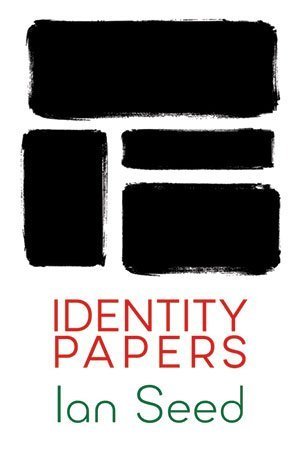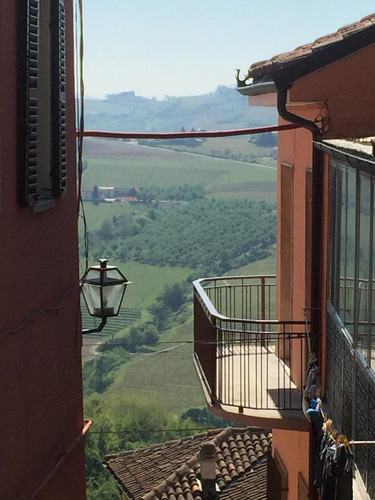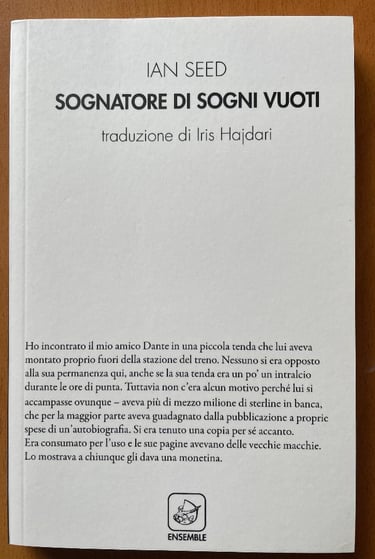From my late-teens on I wanted to write. I was encouraged to do so by my mother, who typed up my poems for me until I was able to afford a typewriter of my own, and an English teacher, David Herbert, who was a published poet. They were the first people to offer me feedback. David Herbert gave me the names of some little magazines of the time and I sent off a few poems. I must have been rejected at least a dozen times before I had a poem accepted by a magazine called Gong, run out of the English Department at Nottingham University. A self-published pamphlet, Into Rolling Red (1975), was featured on BBC Radio Leicester when I was 19 (I still have the recording).
After a year of odd jobs (farm, factory, pub) and some residential voluntary work, I went to Nottingham University to study Philosophy. From there, I continued to send off poems, eventually having work published in such journals of the day as Global Tapestry (Dave Cunliffe), Kudos (Graham Sykes), Iron (Pete Mortimer), Omens (Sam Brown), Outposts (Howard Sergeant), Peeping Tom (Cory Harding), Sepia (Colin Webb), Smoke (Dave Ward), and Zenos (Danielle Hope). Two tiny, duplicated pamphlets, Excerpt (1979) and Flung into Dust (1980), were published by Kawabata, a press run by Colin Webb from Cornwall.
From mid-1981, for the best part of two decades, working in a variety of jobs in different countries in Europe, I more or less gave up writing, although in 1987 I self-published a pamphlet of prose poems, A Man of Some Influence, which people responded warmly to (Sue from Ivrea, where are you now?). I wish I'd taken my cue from this response to persist. However, at least I was in the privileged position of being able to learn languages through lived experience, and I took full advantage of that. I still remember very clearly the thrill of reading books for the first time in Italian, French and Polish.
I only returned to writing with any real sense of commitment in my early forties, when I began sending out poetry to magazines again, self-published a collection called The Stranger (2000), but this was mainly writing taken from my earlier pamphlets, and took an MA in Creative Writing at Lancaster University 2003-4. I think the MA gave me more confidence in my ability to tell stories (both in poetry and in prose), I learnt to write even when I didn't feel like writing because I had to produce something for workshops, and most importantly of all it brought me into a community of writers.
For more on my personal development as a reader, writer and translator, see the following interviews: My Writing Life, Royal Literary Fund, January 2026 https://royalliteraryfund.substack.com/p/my-writing-life-ian-seed; rob mclennan, February 2024 https://robmclennan.blogspot.com/2024/02/12-or-20-second-series-questions-with_01982078551.html; and Wombwell Rainbow, October, 2018 https://thewombwellrainbow.com/2018/10/23/wombwell-rainbow-interviews-ian-seed
Since 2009 I have published ten full-length collections of poetry (eight with Shearsman Books, beginning with Anonymous Intruder, and two with Knives, Forks & Spoons Press), four books of translation, and several chapbooks of poetry, fiction and translation. My poetry has also appeared in a number of anthologies and been featured on BBC Radio 3's The Verb, while New York Hotel (Shearsman, 2018) was selected by Mark Ford as a TLS Book of the Year.
Most recently, Forgetfulness was published by Shearsman Books. See https://www.shearsman.com/store/Ian-Seed-Forgetfulness-p767454180
Over the last decade or so, my poems, stories and translations have appeared in journals such as Flash: The International Short-Short Story Magazine, Granta Magazine, Hinterland magazine, Long Poem Magazine, Modern Poetry in Translation, The North, PN Review, Poetry Salzburg Review, Poetry Wales, Sentence: a Journal of Prose Poetics, Shearsman magazine, Stride and Tears in the Fence. I publish quite frequently online; for some samples, see: https://ianseed.co.uk/online. I am grateful to every single editor who has read my work.
Since 2004, as well as writing, translating and editing, I have worked as a Creative Writing tutor in a wide range of community and academic settings. From 2013 to 2022, I was Senior Lecturer in Creative Writing and Programme Leader at the University of Chester, and I continue to maintain my connection with the university as a Guest Lecturer. I have also taught Italian literature and language at the University of Lancaster, which awarded me my PhD in Italian Literature in 2012.
From 2023 until 2025, I was a Royal Literary Fund Fellow at the University of Liverpool. I am currently RLF Reading Round Fellow in Lancaster.
'The variety and intellectual commitment of Ian Seed’s work is consistent throughout his oeuvre. His persistent search for alternatives to the mere quotidian in a world of the imagination is mesmerising and engaging. The journey never ends; it is a philosophical and clever investigation that is playful and earnest at the same time. The stories that are narrated never fail to surprise the reader and open up unexpected views.'—Carla Scarano D’Antonio, Tears in the Fence.
Some background




